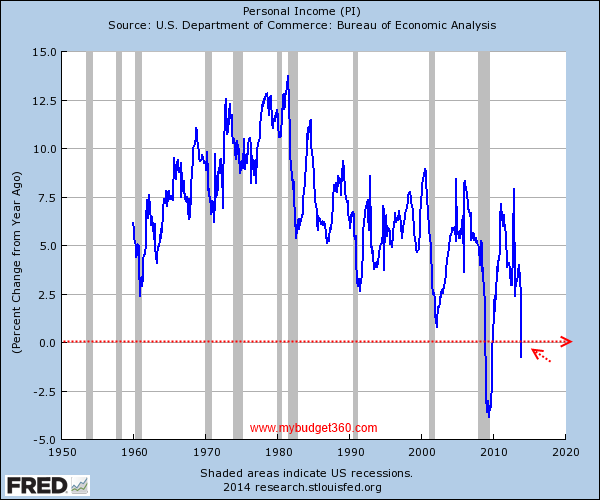Personal
income faces first year-over-year drop since recession ended: As
incomes collapse, spending via consumer credit begins to increase
There
is little doubt that our economy runs on access to debt. Not a
tiny bit of debt. But Himalayan mountains of debt. The
banking crisis was pitched to the public as one of liquidity but in
reality, it was one of solvency. The difference? One is a
temporary inability to repay debts while the other is a complete
mathematical inabilityto support current debts based on income.
The Fed has done everything to increase access to debt to member
banks to re-inflate their balance sheets. Those that think
inflation is non-existent need only look at housing values, college
tuition, and healthcare costs and see how realistic that is based
on their income growth. This leads us to our current article in
terms of personal income. The latest reading shows that
personal income had its first year-over-year drop since the recession
ended. This further underscores the massive disconnect between
the stock market and regular American households. A large part
of boosting corporate profits involved slashing wages, benefits, and
households making due with less. This has increased the wealth
and income inequality in our nation as the stock market
reaches a new apex. What is troubling is that now that banks
are flooded with easy access to credit, they are starting to lend to
cash strapped households in a fashion similar to our last credit
bubble.
Personal incomes fall
I’m not sure if people are aware of how
rare it is for personal income to fall on a year-over-year basis in a
fiat system where inflation is championed.
Inflation
when it goes hand in hand with income growth is rarely felt by the
public at large. However, as we have discussed with the
shrinking middle class, inflation
with no subsequent wage growth translates to a declining
standard of living.
Going back to data form the 1950s personal
income never declined on a year-over-year timeframe. That is
until the Great Recession. So this recent reading showing
personal income declining year-over-year is notable:
Consumer Confidence Drops Most In 4 Months
This Will Stun The World & Bring Chaos To
Global Markets
Greyerz: “Eric,
the deflationary pressures are continuing in many areas. As an
example, the eurozone consumer confidence had the biggest drop in 18
months. And in Germany, the latest figures are showing wage
deflation of 0.6%. We also saw the same deflation in France of
0.6%….
Gov Report: Up To ONE MILLION Jobs Will Be Lost
Due to Minimum Wage Hike
A
few weeks ago the Congressional Budget Office, which is responsible
for the accounting and reporting associated with federal legislation
and regulations, estimated that the Affordable
Care Act would
raise national budget deficits by $1 trillion and lead to the
destruction of some 2.5 million jobs.
But the new health insurance mandates and the
pressure they will put on America’s businesses aren’t the only
challenges facing an already dwindling labor force.
Earlier
this month President Obama raised the minimum wage for
federal workersthrough an Executive Orders that will take effect
on January 1, 2015. He promised to push through a similar mandate for
the private sector. However, just because minimum wage workers in
America will see a roughly $3 increase in their hourly pay doesn’t
necessarily mean that they’ll be better off than today.
According to the CBO, the wage hike is going to
do exactly the opposite of its intended purpose. Not only can we
expect businesses to almost immediately raise prices on the goods and
services they offer in order to offset the wage hikes, but it will
end up costing the American economy even more jobs in the long run.
Once fully
implemented in the second half of 2016, the $10.10 option would
reduce total employment by about 500,000 workers, or 0.3
percent, CBO projects. As with any such estimates, however, the
actual losses could be smaller or larger; in CBO’s
assessment, there
is about a two-thirds chance that
the effect would be in the range between a very slight reduction
in employment and a
reduction in employment of 1.0 million workers.Congressional
Budget Office: The Effect of a Minimum Wage Increase (PDF)
Global Economy Collapses Despite 4th “Warmest”
January On Record
G-10
macro data is collapsing…
http://www.zerohedge.com/news/2014-02-23/global-economy-collapses-despite-4th-warmest-january-record
CLICK
ON CHART TO ENLARGE
The
Shanghai Index, Copper and Freeport McMoran look to be forming
Descending triangle patterns. If you are unfamiliar with this pattern
please read about them here Bottom
line to this pattern, a break of support suggests a decline, the size
of the triangle!
The key to this patterns is the support line,
which must hold, or sellers will step in. Commodities and the largest
country in the world don’t have much to brag about over the past
few years, other than poor performance and relative weakness! If
support breaks, the new thing they could get to brag about ….”we
sent a signal ahead of time that the macro picture was about to slow
down.”
Support at this time is STILL IN PLACE….
support has NOT broken. I am attempting to make you aware of this
pattern should it come true, so you could be thinking about portfolio
construction ahead of time.



No comments:
Post a Comment